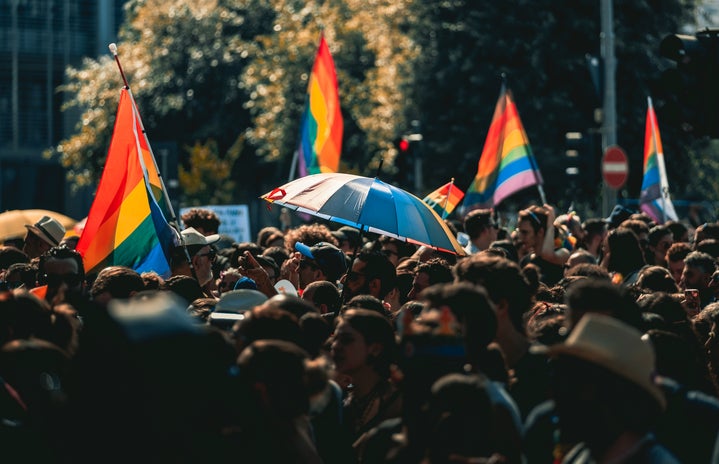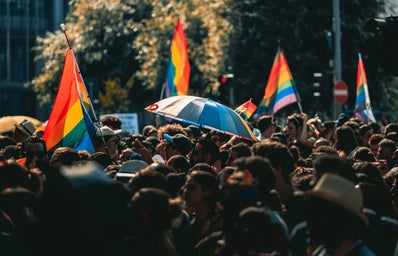If you were to ask me which has been my favorite class so far during all my years as an undergraduate student, my mind will automatically jump to INGL 3375: Gay and Lesbian Narratives. I had to watch, read, and analyze queer content such as movies, series, music videos, and literature. Even though all the class lectures were to be taken online and sessions were only held on Fridays, I’ve never felt such a connection with my classmates and a professor. I cried a couple of times during the semester, and while that’s not absolutely unusual as a full-time college student, it was the first time I cried because I felt genuinely happy to be taking this class. Besides becoming a safe space for me, this course will forever hold a special place in my heart. I still talk with the professor, and this article is dedicated to her.
In that class, one of the first assignments we had to do was watch and analyze a Thai BL (short for Boy’s Love) series. I’d been wanting to watch BL series for a long time, but I didn’t know where to startー so this assignment was perfect for me. Because I really enjoyed watching the assigned series, I decided to approach my professor and ask her for more BL recommendations. She was more than happy to show me a list of her favorites, which sparked an ongoing conversation about BL television series. We’d email each other back to back to discuss our thoughts (as you can imagine, my emails wereー and still areーsuper long).
In the most simplified way, Boy Love Dramas, commonly known in Japan as Yaoi or Shojo, feature queer romance stories about men falling in love, usually aimed at young women viewers. There’s always been a debate whether BL is a problematic genre or not, due to some audiences believing that it portrays harmful stereotypes about gay men and/or because the media within this genre is usually created and consumed by women. While I understand the argument that BL may be used by some women who are looking to fetishize gay people, I don’t think it’s fair to shame an entire audience for enjoying shows about people falling in love; especially when there’s such a blatant lack of LGBTQ+ representation in the Southeast Asian entertainment industry. However, I agree that there’s a lot of BL series that are inaccurately portraying gay men. Although not all BL stories include these tropes, it’s important to create awareness about harmful stereotypes surrounding behavioral/sexual roles, misogyny, promiscuity and rape culture, to mention a few examples.
Nonetheless, throughout my BL-watching journey, I have come across several that I think really break these stereotypes. Here’s a list of some personal favorites that I believe portray homoerotic relationships through a much more realistic lens.
After his twin brother Black is brutally attacked and hospitalized, White decides to investigate the crime and avenge his brother by disguising himself as Black.
This show is a masterpiece. I started watching this show with high expectations from the get-go for two reasons: 1. I was already familiarized with the main actors because I watched Theory of Love and really loved both their characters and acting skills; 2. My professor and a lot of people on social media were hyping this show by constantly emphasizing how different and good it was. I’m pleased to inform you that their praise for this show really hit the mark. The series delves into serious topics in every episode such as rule of law, privileges, impunity, Antitrust and Competition Law, personal struggles surrounding identity and ideologies, marriage equality and LGTBQ+ rights. The writers and directors of this series outdid themselves, considering their portrayal of these themes, and the fact that real activists and LGBTQ+ actors were a part of the production.
Did I cry? Yes. Especially in episode 8, because it’s not common to see such raw and important scenes like the one featured in this episode in any show, including western ones.
After a volunteer teacher dies in a car accident, Tian receives her transplanted heart and struggles to feel like himself with a stranger’s heart. When he learns about his donor’s identity, he decides to follow her steps, which in turn leads him to a village, where he meets Chief Phupha and becomes a teacher. As part of his journey in fulfilling his donor’s promise of counting the thousand stars, he finds himself in a journey of self-acceptance and love.
As far as BL goes, the plot of ATOTS diverges completely from the cliché two-college-students-hate-each-other-and-then-fall-in-love plot. It has a special place in my heart because it was the first one I watched, and the one that led me to bond with my professor. It’s a sweet and emotionally-charged love story where a spoiled rich boy decides to leave everything behind in search of something to fill a heart that no longer feels his (don’t judge me, but I teared up a bit when I saw one of the final scenes).
This romantic coming-of-age show follows the story of ex-childhood best friends, Teh and Oh-aew, as they prepare for university admissions while trying to ignore the other as much as possible.
I have never watched a series like this in my entire life. The main question shouldn’t be if I cried, but rather: when did I not cry? I didn’t cry because it was sad in every episode; I cried because the actors did such a good job throughout the show that I felt as if I was beside them instead of watching a fictional story through a screen. Everything felt realーfrom their struggles of studying for the admission tests, to the raw and devastating scenes of them trying to understand their identities as individuals, friends, and perhaps as something more. Although some scenes didn’t feature much dialogue, they present the audience with shots of both protagonists exploring themselves and their relationship in the purest and most beautiful ways possible. From the colors, the setting, and the choice of music, to the dialogues and the characters, I Told The Sunset About You should be a must in your To-Watch List.
A fictional writer longs to write dark fantasy stories, but his company publisher suggests he write a BL instead. Shortly after heeding his advice and publishing the novel, it becomes an instant hit that’s being adapted for TV as Bad Engineer. One of the actors chosen for the role of Gene’s novel takes an interest in him, which leads to a story of secrets, hidden love, and jealousy.
What may seem like another nice-but-forgettable love story, Lovely Writer includes a balanced mix of fun and seriousness that paves the way for the discussion of heavy topics such as the toxicity within the BL industry and fandom. I was not expecting them to address these issues so blatantly. On the one hand, we have Gene’s publisher who is pressuring him to write another BL novel rife with sex scenes and lacking any character depthーwhich he clearly feels uncomfortable with. On the other, the fandom is shipping the main couple of the show Bad Engineer who are not together in “real life”. This show portrays the realities some actors and writers have to go through in order to satisfy both the audiences and the companies that produce their shows.
Pran and Pat’s families have always tried to one-up the other, passing on this competitiveness to their sons. That is, until they get tired of “hating each other” and instead become good friends. Due to their family’s long-standing rivalry, they have no choice but to hide their friendship… and perhaps even their secret romance.
Despite the fact that college student protagonists are fairly common in BL shows, I find that this series did a great job with the creation and presentation of their characters. For starters, the women in this series have personalities other than being the crazy ex-girlfriend. Thankfully, the series does not include a single cringe stereotype, which further supports my belief that the show’s director decided to make a series targeted specifically for the LGTBQ+ community. I think out of every BL show included in this list, this was the least I was expecting to like so much. I started watching the series with no expectations whatsoever, waiting to see yet another enemies-to-lovers college students romance. Instead, I got to watch real character depths and developments, healthy relationships featuring good communication, and an excellent script. Everything about this show feels natural, and it also has a good pace. Suffice it to say that Bad Buddy is definitely worth watching.
Although I have watched other BLs, I haven’t gotten the opportunity to watch most of them. In other words, this list will be gradually upgraded in my notes (and in the long emails to my professor) as I keep adding BLs I believe are revolutionary and amazing. I think it’s important what countries in Asia are doing for the community and its representation. Both sides of the world are being more open-minded towards these love stories and I can’t wait to be part of the process.


